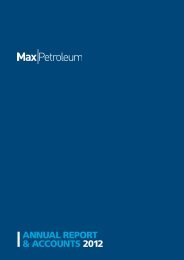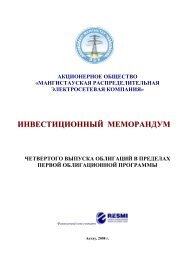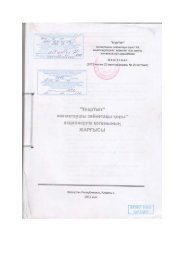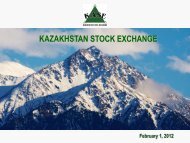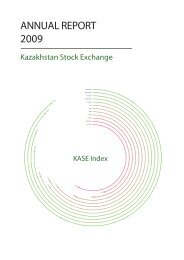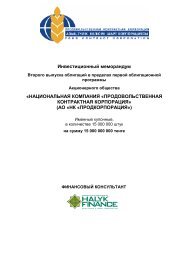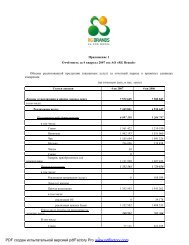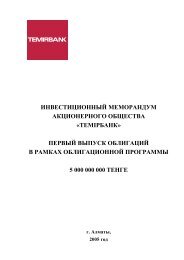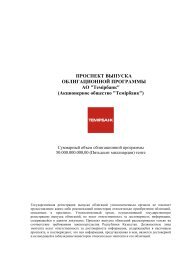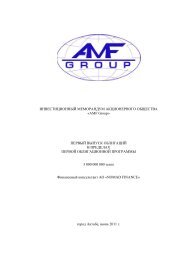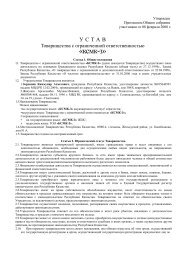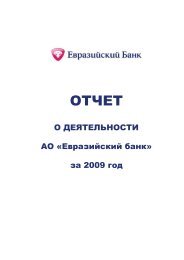JPMorgan - KASE
JPMorgan - KASE
JPMorgan - KASE
Create successful ePaper yourself
Turn your PDF publications into a flip-book with our unique Google optimized e-Paper software.
Kazakhstan’s foreign investment, petroleum, subsoil use, licensing, corporate, tax, customs,<br />
currency, banking and antimonopoly laws and legislation are still developing and uncertain.<br />
From time to time, including the present, draft laws on these subjects are prepared by<br />
government ministries and some have been submitted to Parliament for approval. Legislation in<br />
respect of some or all of these areas could be passed. Currently, the regulatory system contains<br />
many inconsistencies and contradictions. Many of the laws are structured to provide substantial<br />
administrative discretion in their application and enforcement. In addition, the laws are subject<br />
to changing and different interpretations. These factors mean that even our best efforts to<br />
comply with applicable law may not always result in compliance. Noncompliance may have<br />
consequences disproportionate to the violation. The uncertainties, inconsistencies and<br />
contradictions in Kazakhstani laws and their interpretation and application could have a material<br />
adverse effect on our business and results of operations.<br />
Our exploration and production licenses and hydrocarbon contracts and other agreements may<br />
be susceptible to revision or cancellation, and legal redress may be uncertain, delayed or<br />
unavailable. For example, it has recently been reported that the Kazakhstani government has<br />
taken the position that it is not bound by certain oil and gas field development contracts it had<br />
signed with third parties in the early 1990s and that such contracts may now be revised. In<br />
addition, it is often difficult to determine from governmental records whether statutory and<br />
corporate actions have been properly completed by the parties or applicable regulatory agencies.<br />
In some cases, failure to follow the actions may call into question the validity of the entity or the<br />
action taken. Examples include corporate registration or amendments, capital contributions,<br />
transfers of assets or issuances or transfers of capital stock. Ensuring our ongoing rights to<br />
licenses and hydrocarbon contracts will require a careful monitoring of performance of the terms<br />
of the licenses and hydrocarbon contracts, and monitoring the evolution under Kazakhstani laws<br />
and licensing practices. See “Business and Properties — Upstream Operations — Material<br />
Licenses.”<br />
Changes in policies of the Kazakhstani government may adversely affect our business.<br />
Governmental policies may affect our ability to market crude oil and refined products. For<br />
instance, the Agency for the Republic of Kazakhstan for the Regulation of Natural Monopolies<br />
and the Protection of Competition, or the Antimonopoly Committee, can impose pricing<br />
restrictions on our sales as a result of our leading market position in the Kazakhstani domestic<br />
refined product market and the governmental recognition of HOP effectively as an entity with a<br />
dominant position. Accordingly, we are required to obtain the approval of the Kazakhstani<br />
government with respect to any refined product price increases. In addition, in the past, the<br />
Kazakhstani government has required us to write off certain receivables, particularly for<br />
customers in the agricultural sector. We cannot assure you that the Kazakhstani government will<br />
not recommend or require us to make similar write-offs for the benefit of third parties in the<br />
future. Any further strengthening of antimonopoly requirements may adversely affect our<br />
financial condition and results of operations.<br />
Changes in our export quotas may adversely affect our business.<br />
Since late 1999, the Kazakhstani government has regulated the export of crude of oil and the<br />
supply of the domestic market by setting policies limiting on a monthly basis the amount of<br />
exports of oil by producer and by export route. Until recently, the regulatory process, although<br />
cumbersome, was administered in the framework of an annual plan mutually agreed to and did<br />
not result in actual restrictions. In the past, however, following personnel changes at the<br />
Kazakhstani Ministry of Energy, this process had lost its consensual character, resulting in export<br />
quotas being set for our operations that did not allow us to fully exploit our capacity. This, in<br />
turn, forced us to reduce our production of crude oil and resulted in lost sales. Although<br />
production did return to expected levels following these periods, there is no assurance that<br />
future limitations which may impact our ability to capitalize on export opportunities will not be<br />
imposed. Any future changes in the oil and gas policies by the Kazakhstani government could<br />
adversely affect our financial condition and results of operations.<br />
21



